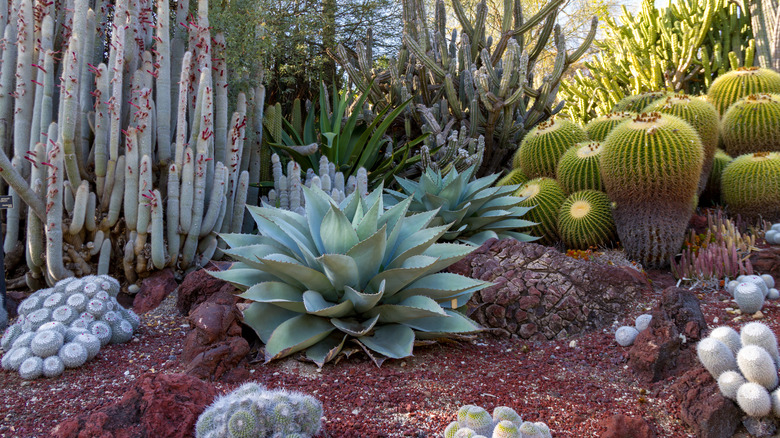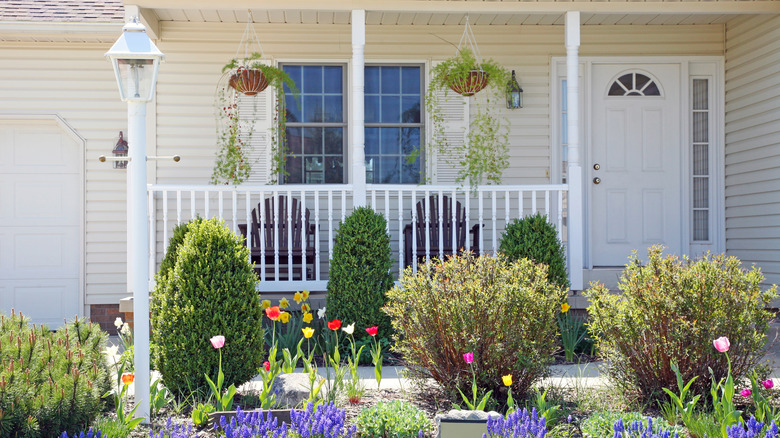Why You Should Steer Clear Of Spiky Plants In Your Garden When Selling Your House
First impressions often take a lot of work to erase, which is why a home's curb appeal is so critical. When potential buyers walk the pathway to the front door, they will be drinking in all the outdoor details, from the house's trimming and paint color to the grass quality and garden. The AA finds that buyers are willing to pay up to 5% more for a home with an attractive garden. But while plants are perfect for sprucing up a house's external appeal, some can be hazardous and unpleasant.
Immediately, we might think of invasive weeds and toxic vines like poison ivy, but you should also avoid spiky plants. Although cacti and other succulent-like plants fall under the rising trend of desert modernism, and are loved for their dimension, texture, neutral shades, and boho style, they can also create an unsafe environment. Spiky plants can easily injure children, pets, and anyone not paying close attention to their protruding bristles at any given time. Many cacti and succulents also have harmful saps, causing health problems for both humans and animals if ingested. Steering clear of prickly plants as you look to sell your home will be your safest bet.
Why it's best to avoid spiky plants
A majority of people look for family-friendly qualities in their future homes. A yard that can host birthday parties, allow the dog to run wild, and hold cookouts with friends will be top of mind for buyers. While gardens are a great way to create an attractive outdoor environment, not all plants will be safe or appropriate for such an active space.
Michael Szymanski from eXp Realty in Phoenix told Apartment Therapy, "You're not going to want to have a lot of cactuses in the front yard if you have toddlers running around or if you're targeting younger demographics of families to sell to. More younger families with kids are getting into homes, so we're seeing less desire to have cacti in the yard just from a safety standpoint."
Along with cacti, other succulent-like plants, such as agave and aloe vera, are potentially dangerous. Aloe plants are toxic if consumed by humans or pets, resulting in rashes, vomiting, and digestive issues. Cacti and succulents also produce sap that can induce stomach irritation and allergic reactions if eaten. Two commonly known poisonous succulent varieties include Kalanchoe and Euphorbia. While cactuses first come to mind when considering spiky plants, there are also many prickly evergreen plants, like California fuchsia, honey locust, and porcupine tomato, that are frequently-seen varieties to avoid.
Family-friendly plants increase property value
A significant appeal of desert plants in gardens is the unique charm and style they promote. Still, there are many non-traditional and alluring plants to choose from that won't present a safety hazard.
Honeysuckle is primarily loved for its sweet-smelling aroma and ability to attract hummingbirds and other essential pollinators. The perennial features oval green foliage with trumpet flowers that are often yellow but can come in hues of pink, red, and orange as well. Honeysuckle is a great splash of color and will give you great coverage, growing to be 15 to 20 feet tall. Azaleas are also a vivid option, blooming earlier than most flowers to give your garden a headstart on summer colors. Azaleas are loved for their easy care, resilience, and ability to attract bees and butterflies.
Hostas are another excellent choice, especially considering that they look similar to agave plants but without dangerous teeth. Hostas provide various design possibilities, with their leaves taking on many shapes, shades, and patterns. Easy to propagate, low maintenance, and hardy plants, you can't go wrong with adding them to your outdoor space. Lastly, it's no secret that trees positively impact property value, and you can choose an unconventional option with citrus trees. Able to thrive in containers or directly in the ground, citrus trees can be bought from nurseries or planted with the expectation to bear fruit within three to six years. Their vibrant and fresh produce will have buyers in a frenzy.


